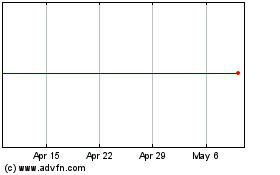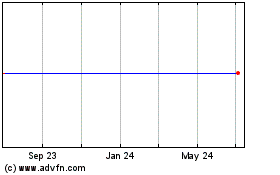UPDATE: Demand Outstrips Supply For High-Grade Corporate Bonds
March 01 2012 - 5:56PM
Dow Jones News
The corporate bond market continued to outperform Treasurys on
the first day of March, as investors continue to find value even
with yields sitting at multidecade lows.
Recent issues saw follow-through buying in the secondary market,
MarketAxess data show. Berkshire Hathaway (BRKA, BRKB) unit
Burlington Northern Santa Fe's 30-year bonds strengthened 0.03
percentage point against Treasurys, and CBS Corp. (CBS, CBSA)
10-year notes improved 0.02 point.
The primary market absorbed just three new senior unsecured
deals, but they were large enough to total $5.5 billion. In
addition, Credit Suisse Group AG (CS, CSGN.VX) priced $2 billion of
top-rated covered bonds.
Wells Fargo & Co. (WFC) led the way with a $2.5 billion
offering of 10-year notes at 1.5 percentage points over the
Treasury rate, to yield 3.526%. Last March, the bank sold $2.5
billion at a better spread of 1.3 points over Treasurys, but the
yield paid was roughly 0.80 lower this time thanks to lower
Treasury rates.
National Australia Bank Ltd. (NABZY, NAB.AU) sold $2.5 billion
deal featuring $1.5 billion of three-year notes at 1.6 percentage
points over Treasurys, and $1 billion of five-year notes at 1.9
percentage points over Treasurys. They yielded 2.01% and 2.789%,
respectively.
The financing arm of Paccar Inc. (PCAR), the heavy-duty truck
manufacturer, sold $500 million of five-year notes at 0.70
percentage point over Treasurys, to yield 1.604%.
"There are a ton of issuers that are salivating at this market,"
said Timothy Cox at Mizuho Securities. "Issuers know it's an
opportunistic market, and there's a huge amount of money in the
system."
Companies are doing what they can to expedite the process of
exiting the earnings blackout period and tap the debt markets, he
added. He projects March volume at $75 billion or higher, following
a February record of $98.1 billion, according to Dealogic.
Demand for high-grade corporate bonds has been ravenous in
recent weeks, with average corporate yields falling to all-time low
of 3.28% on Tuesday. Yields stayed put on Wednesday, but with
Treasurys losing ground after Federal Reserve Chairman Ben Bernanke
dashed hopes of further quantitative easing, corporate bond spreads
were able to strengthen 0.03 percentage point to an eight-month low
of 1.824, according to Barclays Capital.
Companies such as McDonald's Corp. (MCD), BHP Billiton Ltd.
(BHP), and Procter & Gamble Co. (PG) achieved financing at some
of the cheapest rates ever last month. Six companies even issued
30-year bonds at an interest cost of 4% or less, including PepsiCo
(PEP) on Wednesday, according to Dealogic.
High-grade bond spreads continued to improve Thursday, a day
after the European Central Bank approved nearly EUR530 billion
($706 billion) of three-year, 1% loans to the European banking
system, in round two of its three-year Long-Term Refinancing
Operation.
Markit's CDX North America Investment Grade Index, a measure of
health for the market, was on track to finish at its best closing
level since July 8. It had advanced 0.8% in late trading to sit at
93.1 basis points, versus 120 at the end of 2011.
Traders at CRT Capital said they are getting wary about whether
the improvement can continue. High-yield and investment-grade
corporate bonds "have clearly become more expensive in recent
months," having outperformed Treasurys by about five and 3.50
percentage points, respectively, since late December, with spreads
tightening by 1.15 points and 0.56 point, they noted. Meantime, the
ratio of company upgrades to downgrades has fallen sharply.
"We certainly understand that many investors discount the
insight offered by" the rating firms, CRT said, "but the change in
tone derived from their company-specific efforts is too notable to
be ignored. It's still too early to cut exposure [to corporates],
but that potential is now on our radar screen."
Elsewhere in the primary market, Credit Suisse paid 1.05
percentage points more than the Treasury rate on $2 billion of
three-year covered bonds. This was on the wider end of original
pricing guidance and compares with Quebec bank Desjardins paying
just 0.772 point over the Treasury rate on a five-year covered bond
deal Wednesday.
Covered bonds offer investors two layers of protection from
default--the faith and credit of the issuer, like an unsecured
corporate bond, as well as a portfolio of actively managed assets,
typically mortgages.
The deal underscores the higher borrowing costs European banks
must pay, even on a triple-A-rated security.
"This is exactly why banks would rather LTRO like mad men than
do covered bonds," says Guy LeBas at Janney Capital Markets.
-By Patrick McGee, Dow Jones Newswires; 212-416-2382;
patrick.mcgee@dowjones.com
CBS (NYSE:CBS)
Historical Stock Chart
From Apr 2024 to May 2024

CBS (NYSE:CBS)
Historical Stock Chart
From May 2023 to May 2024
